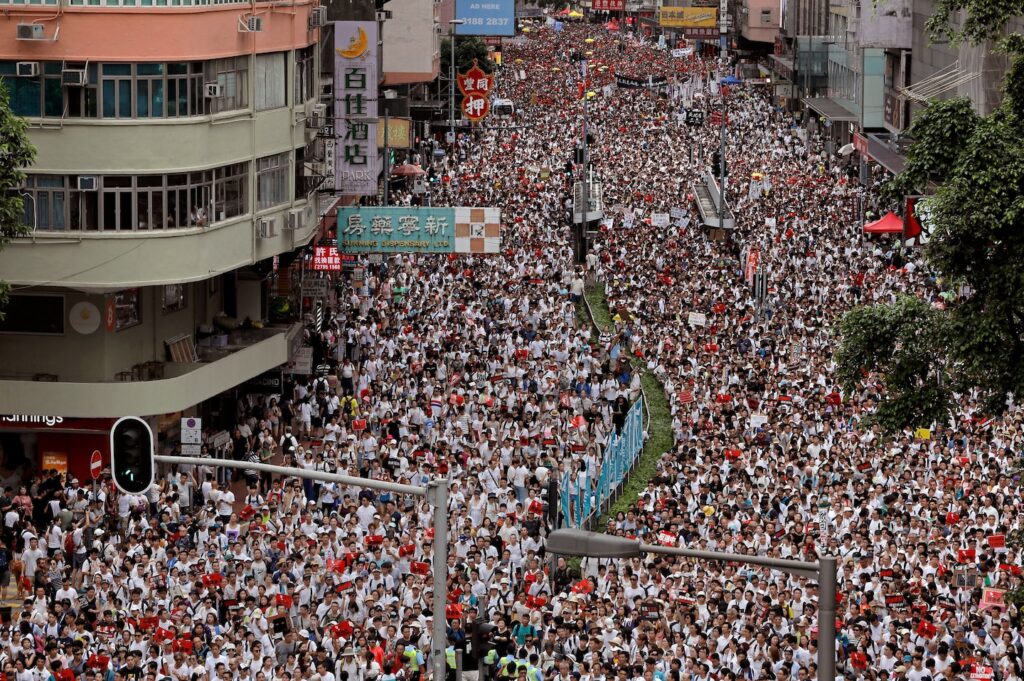HONG KONG — Five years ago, on June 9, 2019, I watched one million people march through the streets of Hong Kong.
Some people estimated the crowd numbers higher; the police, as they do everywhere, underestimated them. But it was a sea of people as far as the eye could see from my seat on one of the elevated walkways throughout the city. It was the largest protest demonstration in Hong Kong's history, and by far the largest I'd ever seen.
The protests were also almost entirely peaceful, even festive, and represented a cross section of Hong Kong society: students and seniors, well-known activists and ordinary people, couples pushing children in strollers, etc. The only time the protests turned ugly was briefly in the middle of the night, when police fired pepper spray at several hundred stragglers who refused to disperse.
On that sweltering day, the crowd had rallied with just one demand: that Hong Kong's handpicked leader, Chief Executive Carrie Lam, repeal a flawed extradition bill that would allow criminal suspects to be sent to mainland China for trial.
In retrospect, it seems odd that a technical change to an existing law should have attracted such widespread public attention and backlash. Lam argued that the proposed amendments to the extradition bill merely closed “legal loopholes.” Hong Kong already had extradition agreements with a dozen countries. China had inadvertently been excluded.
That is not true. China was deliberately left off the list when sovereignty over the Hong Kong Special Administrative Region was handed over from the UK to China in 1997. Hong Kong enjoys a common law system and has proudly upheld internationally recognized judicial standards and human rights. China's legal system is, and remains, a black box. In China, suspects of crimes are subject to arbitrary detention, torture, forced confessions and denial of medical treatment. China boasts a 99 percent conviction rate for suspects, and trials are sometimes held in secret.
Hong Kong people are smart. They clearly understood that Lam's extradition bill would destroy the legal barrier that separates semi-autonomous Hong Kong from Communist-ruled mainland China. To show their anger, they took to the streets in unprecedented numbers.
Normally, the sight of a million people taking to the streets would make any elected leader hesitant. But Hong Kong in 2019 was not a normal place, and Lam was not an elected leader. She was a career bureaucrat with no political experience, appointed by mainland China and approved for the position by a pro-China subcommittee. The vast majority of Hong Kong residents had no say.
Lam's response to the million-person protest was one of imperial scorn. She said people “don't understand” the bill. The government just needs to communicate better, she said. And in her most condescending remark, she likened the protesters marching in the streets to a child throwing a tantrum to get his way. Three days later, on June 12, 2019, Lam vowed to force the hated extradition bill through the pro-Beijing Legislative Council.
But that didn't happen. Angry protesters surrounded the legislative building, blocking roads and charging into police barricades. Police responded violently with tear gas and, for the first time in my memory, rubber bullets. Lawmakers were unable to reach the chamber, and the vote was postponed. After a few days, Lam reluctantly put the bill on hold.
The protesters learned a lesson that day, one that ultimately led to Beijing's crackdown and the remaking of the city in China's authoritarian image. We marched peacefully, several of them told me later, and Lam ignored us, but when we got violent, she suspended the bill. Violence has consequences, they concluded.
Suspending the extradition bill meant it could be put to a vote later. Lam staunchly rejected protesters' demands to withdraw the bill altogether, a stance she maintained for months until September. But it was too late.
By then, the protesters' demands had increased and the protests had become more violent. They demanded an independent investigation into the police brutality that occurred on June 12. They demanded the release of those arrested and the dropping of the riot charges. They called for universal suffrage and for Chief Executive Carrie Lam to resign.
None of those demands concerned independence from China.
In mid-2020, China imposed a draconian national security law on Hong Kong, stifling protests and dissent, forcing the closure of independent media, and disbanding civil society organizations and labor unions. Since then, China and its Hong Kong minions have called the protests that began on June 9 a “black riot” and claimed they were instigated by “foreign forces” seeking to foment a “color revolution” against the Chinese Communist Party. Incredibly, some have alleged that all the protesters were paid by the CIA.
Of course, that's nonsense, and government officials and pro-China propagandists know it. It's also arrogant to think that Hong Kong people needed foreign help to organize a mass resistance.
Five years later, I continue to think about a series of “what ifs” — counterfactual assumptions that might have changed the trajectory of Hong Kong's history and saved it from the oppression it currently faces.
What if, after the June 9 protests, Lam had been less stubborn, listened to the protesters and immediately withdrew the extradition bill?
What if the protesters had remained peaceful, without resorting to violence and inviting a heavy police response?
What if protesters had not incurred Beijing's ire by attacking Chinese government buildings in Hong Kong, painting over the Hong Kong city emblem with black paint, and vandalizing mainland China-related businesses? After June 9, Chinese media largely ignored the mass demonstrations. Would Chinese leaders have continued to turn a blind eye to the unrest without the provocation?
We may never know what would have happened, but we do know that Hong Kong was irrevocably changed by the events that took place on that second Sunday in June five years ago.



